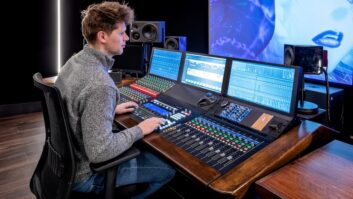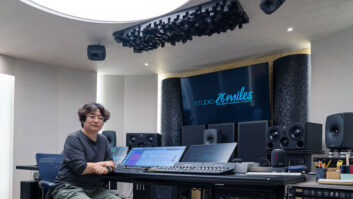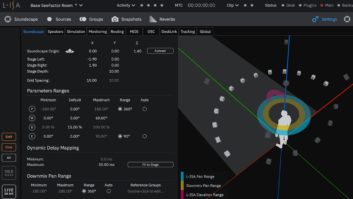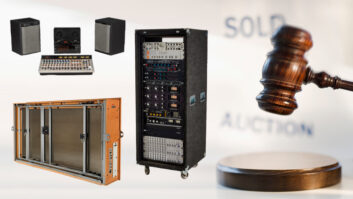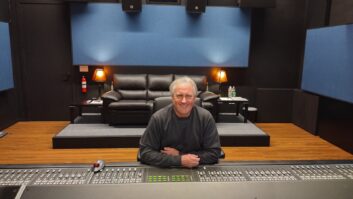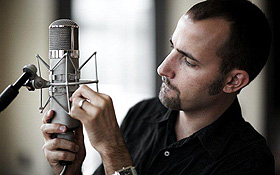
Josh Woodhouse
Every studio owner has a different story to tell and a unique journey that led him to where he is now. No matter the road that’s been traveled, each has been peppered with a variety of lessons. In this edition of “Confessions of a Small Working Studio,” the professionals we talked to share some of the most important lessons they’ve learned along the way and how they’ve applied these lessons to their careers.
Lesson #1: Get a Grip on Fundamentals
“My instructor in school would say to me, ‘Listen, I know that you have this thought that the music industry is cool and all about rock ‘n’ roll, but before you can enjoy any of that, you’ve got to get the fundamentals down. You’ve got to take the time to get the core elements nailed,’” says Josh Woodhouse, the owner of Austin’s Droplink Studios. “I can’t tell you how right he was. Taking the time to get outside the ‘glamour’ and focus on the technical side of engineering and producing was an extremely important lesson to learn in the beginning of my career.”
In fact, that was one of the reasons Woodhouse was able to learn, early in the game, how to effectively but gracefully handle problems that arise during sessions. “By having the fundamentals down, I learned how to break down where a problem is in the signal path and how to troubleshoot it without the artist ever really knowing there was an issue,” says Woodhouse, who adds that confidence has a direct effect on how a session runs. “There could be a complete meltdown going on in the control room, but as long as you have the confidence that you’ll be able to figure out how to fix things, the artist will never know, and that’s the way it should be, because if you show stress, the artist is going to be stressed, too.”
Lesson #2: Learn the Art of Honest Diplomacy
Producers and engineers are sometimes incorrectly labeled as mere button-pushers. Yes, they’ve got to know how to manipulate the controls, but they also have to know how to finesse something else: The clients they work with. “I don’t know what’s more stressful: working with art or working with money,” says Dungeon Recording Studio (Miami) owner Fredric Freeman with a laugh. “If you’re in this business, you have to know how to work with people. At the end of a session or a project, I want to see a smile on the faces of the artists who are in my studio.”
But Freeman isn’t interested in creating smiles based on empty flattery. In fact, he maintains that he’s extremely picky about what leaves his facility, and he’s not afraid to tell his clients the truth; he just does it with tact and in a way that brings out the best in them. “Recently, I was working with this young band that is just starting out. I recorded their album, which includes several really catchy tunes, but I knew they could have been better if the singing had been more up to par,” says Freeman. “I brought the bandmembers all together and told them what I thought in a direct but diplomatic way. They appreciated my honest approach and are now on the hunt for a new lead singer that will better showcase their music.”
Lesson #3: Give 100 Percent, Every Time
Because success in the music business is largely based on word of mouth, it’s important that everything that leaves your studio represent you and represent you well. “I’m a firm believer in allowing my product to speak for itself, which is why I don’t let subpar work leave my facility,” says Woodhouse. “It’s Murphy’s Law that the one album that you hurried on or half-assed will be the album that gets the most attention, and for some it will be the one record that you’re remembered by.” Woodhouse cautions that if you slack or rest on your laurels, you’re heading down a dangerous slope. “There’s always a younger guy out there who is hungrier and who will capitalize on your mistakes, so you’ve got to constantly remind yourself that doing your almost best isn’t going to cut it.”
From left; Dave Kerzner, Fredric Freeman and Ken Scott
Lesson #4: Create Your Own Competitive Edge
We’ve all been through this one before, right? You know you do good-quality work. You know you are worth every penny (if not more) of what you earn. You know you’ve got the skills. But what makes you different than the other guy in town who touts the same qualities you do? It’s your job to figure it out, and it’s a must. Freeman figured out what his competitive edge was, but he was reluctant, at first, to take the risk associated with it. “Early on in my career, I had a business partner who was a super-talented engineer, and he wanted certain equipment for the studio. I, being the business man that I am, was very hesitant about the purchase because of the expense, but he was persistent, and I finally caved.”
Freeman is glad he did because now he’s one of the only guys in Miami’s indie music community who has a 2-inch tape machine. “There are a lot of clients who are looking for the sound that only analog can create, and this—along with the SSL console I also caved in and purchased—have become part of what attracts people to the studio and gives it an edge over other small studios in the area.”
Lesson #5: Take Wise Risks
In fact, risks are essential to growth, even if they cause pain. Daniel Dennis, the owner of Nashville’s Prime Cut Studio, understands this phenomenon. He knew he had outgrown his previous space and was time to expand into a larger facility. “I knew what kind of space I was going to need to record drums and bands in, but I also knew that it was going to be a risk to take on a building project. It took me over six months to finally find a property that I felt would be suitable,” recalls Dennis.
The property he ultimately chose was a single-family home that included a detached garage. The space was a blank slate for him, but he visualized the completed facility and the requirements for the workflow that would take place within it before any work started. “The challenge came in getting the project completed quickly and within my budget,” says Dennis. “I hired a contractor to handle the framing, electrical, insulation and dry wall, but then to save money, my dad, grandfather and I took on all of the finishing—and we had only one month to get it all completed before I had to begin bringing clients in.”
An important lesson: Dennis did not go into the project blindly. He spent countless hours researching studio design, soundproofing, acoustics and building techniques. The risk proved profitable.
Lesson #6: Know Your Limitations
All that said, another critical lesson to learn is recognizing and respecting your limitations. This, unfortunately, is a lesson that Freeman had to learn the hard way. “I met this wonderful, in-demand vocalist who had come to the studio to lay down background vocals on a number of tracks. She had such great connections that I thought she would be a perfect person to partner up with to bring in major clients, so I went all out,” explains Freeman.
Unfortunately, he decided to branch out a little too far. “I wound up buying a 1920s house in downtown Miami, sinking a lot of money into transforming it into a studio, and in the process I neglected the Dungeon and lost sight of what I got into this business for in the first place. As a result, I’m still carrying debt because of the expansion. The reason this wasn’t a winning deal is because I lost sight of what was important.”
In spite of the financial pinch he continues to feel, Freeman feels the experience was invaluable. In the process, he learned that he doesn’t need major-label projects for fulfillment. “The situation reminded me that I actually enjoy working with indie bands and artists because they appreciate what I do for them, and it reminded me that it’s imperative to follow your passion, not your wallet.”
Daniel Dennis
Lesson #7: Resist “Desperation” Work
Speaking of tight finances, one surefire way to create problems is to take on work out of desperation. “I have a rule with myself that I never take on a job that I normally wouldn’t take just because I need the money,” says Woodhouse. “At the time, it may seem like taking on a project to make a quick buck will save you, but in the end it often comes back to bite you because whenever you put the money first, it will alter how you work.” Like Freeman, Woodhouse regularly reminds himself why he got into this business in the first place, and “money wasn’t it.”
Lesson #8: Branch Out
Yes, we’ve talked about this a time or two before in the column, and likely will again because it’s that important. In fact, each of the studio owners we interviewed for this piece discussed ways in which they are diversifying within their own studios to create additional revenue streams. Even though money may not be the reason you became a producer or engineer, you do need some to survive. Woodhouse learned the value of diversifying early on and has embraced it ever since. For him, diversification means being open to working on projects that represent various musical genres, as well as other areas involved in the audio post world, including ADR, audio sweetening and digital transfers. “If you’re not willing to branch out, you won’t have anything to fall back on when things get rough,” he says.
Freeman has taken on a teaching job in an engineering school to create a second source of income. Fortunately, it’s as enjoyable as it is profitable. “It’s a really rewarding job for me because I get to help up-and-coming engineers learn about all aspects of the business, from the problem-solving, to the psychiatry, to the thinking on your feet, to the technical aspects,” says Freeman.
As a producer/engineer with a background in graphic design, for Dennis the choice to diversify came easily. Adding graphic design to existing recording services has become a significant selling point for his business. “Artists who I work with not only get their albums produced at my facility, but they also get their Website or CD designed, which makes life a lot easier for them, and that is huge,” he explains. “It’s a good idea, especially if you’re just starting out, to consider offering more than one related service. For me, the balance works well because during the slow times of recording, I have design projects to fall back on.”
Lesson #9: Get Out and Show Your Face
“One of the biggest realities in the clubs in and around Austin is that you never know who you’re going to meet,” says Woodhouse. “You could very well run into a big-time producer or client who you’ll be able to work with for the next three years.”
But the trick is: You’ve got to get out there and network. “If you’re not working, you should be out at the venues checking out the bands and artists and introducing yourself to them,” says Dennis. “This is especially important if you’re just starting out because if you’re willing to work hard and find an artist or band that you feel connected to, you may be able to convince them to let you record their EP or single just for experience sake, and if they like you and what you produce, they’ll likely tell other artists about the experience and come back again.”
Lesson #10: Expect and Embrace Sacrifice
Success in the recording business will not come without some sacrifice, so be prepared to make some of your own. “I work a lot,” admits Dennis. “There are no shortcuts in what I do. I work hard, I live by the calendar so I can get everything done, and I recognize that I’ll have to sacrifice having much of a personal life to do the job I do, but for me the pros outweigh the cons.” If you’re not willing to work hard—sometimes for small material gain—the music industry probably isn’t for you.
Lesson #11: Put the Client First
Every lesson you learn along the way should culminate into one important reality: The work you do is not about you, it’s about your client. “Your clients come to you because they expect you to record and capture their art, not because they want to help you pay your bills for the next month,” says Woodhouse. “It’s your job to put them front and center, to highlight their artistic expression and to add a little more on top to justify why they chose you over the other guy.” If you keep that lesson in mind, you’re on the right track.
Some of Our Favorite “Lessons” from Past “Confessions” Interviewees
“My ultimate goal is to make sure that my client is happy with what I deliver, and I will work on a project until I feel it is acceptable, but at the same time I have to monitor myself and force myself to stop if I see that I’m putting too much time into a project and not getting a fair amount back.”
—Kevin Kniowski, May 2011
“If we’re asking a band to spend their hard-earned money at our studio, especially given the current economy, they have to know that you care how their project turns out. It’s really important to imply a promise that they’re going to leave happy and that we’re going to make sure of it.”
—Doug McBride, September 2010
“I could set up high-quality Neumann mics in a home studio and the sound would be okay, but the reality is, what I get is not going to sound the same as it does in an acoustically treated space that has been specifically created to record music.”
—Adelio Lombardi, November 2010
“Just because you have a Pro Tools box doesn’t mean you know how to use it. The more you read and study the craft, and the more you learn about the business of making records, the better you’re going to be able to handle unexpected curves that vocal sessions tend to throw at you during sessions.”
—Vance Powell, August 2011
“I was fortunate enough to be able to capitalize on [opportunities] by doing the best that I could do on every project that I was given, and I think that is what is largely responsible for what I’ve been able to do.”
—Andrew Dawson, March 2011
“You’ve got to be ready and you’ve got to be prepared—always!”
—Darlene Love, July 2011
“It’s a big deal for artists to go a long way from home to do a recording project, so establishing a sense of familiarity and comfort before they ever set foot in the studio is really important.”
—Steve Tviet, June 2010
“We can’t have a client feel like they’re dealing with some apathetic stranger.”
—Andy Symons, October 2009
Lisa Horan, Stephen Joseph Antonelli and Kevin Hill, co-founders and owners of PopMark Media, will be sharing some of their own lessons at the 131st AES Convention in New York on October 22nd when they will be featured on a panel entitled “Lessons from Savvy Owners,” which is sponsored by SPARS.
